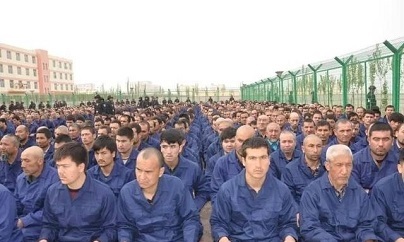Xinjiang Province of Western China represents a harrowing example of how government fears, in this case of separatism, terrorism, and religious extremism, can lead to disastrous religious restrictions justified as security measures but which ultimately act to the detriment of both the state and its citizens.
In August, the UN Committee on the Elimination of Racial Discrimination (CERD) reported that in Xinjiang Uyghur Autonomous Region, “upwards of a million people are being held in so called counter extremism centers and another two million have been forced into so called reeducation camps for political and cultural indoctrination.”
China received the highest rating on the Government Restrictions Index out of the 198 countries measured in a 2016 report by the Pew Research Center on global restrictions of religious freedom around the world. Within such a context, Xinjiang is one of China’s province hit the hardest.
Xinjiang is by many accounts a security state, where government security spending has increased dramatically over the last few years. The situation has characteristics of apartheid with measures specifically targeting Uyghur citizens, including biometric scanning, rankings of citizens’ trustworthiness, and security checkpoints.
The UN panel cited credible sources the Xinjiang Uyghur Autonomous Region resembles “a massive internment camp shrouded in secrecy, a “no rights zone”, while members of the Xinjiang Uyghur minority, along with others who were identified as Muslim, were being treated as enemies of the State based on nothing more than their ethno-religious identity.”
Photo reported to show detainee in a Xinjiang Re-education Camp located in Lop County listening to “de-radicalization” talks.
Photo Source: Wikipedia Xinjiang Re-education Camp Lop County
China has flatly denied such allegations, claiming such camps do not exist in China. The Chinese government claims the recent security measures in Xinjiang are for security safety and development of one of their most backward provinces–a province which happens to hold a wealth of resources and strategic importance to China’s economic plans in South and Central Asia.
These measures have also led to greater restrictions to religious freedom in the region. Because the Chinese government fears separatism in the region and Uyghur identity has been conflated with ethnic separatism and Uyghur identity has been conflated with Islam, Chinese government calls to sinicize, or become more Chinese includes severe and strict restrictions on Islamic religious identity. The government has banned Muslim greetings, possessing halal food, fasting during ramadan, certain Muslim names, religious content and materials on phones and in homes, and the wearing of long beards or headscarves.
This fear of Islamic expressions of identity in China has increasingly targeted other Muslim minorities in China not affiliated with ethnic separatism. The Committee on the Elimination of Racial Discrimination’s Gay McDougall, Committee Co-Rapporteur for China noted reports of other Turkic Muslim minorities who also face restrictions on their religion and can be found in Xinjiang’s internment camps. The Hui are a Muslim ethno-religious minority who have lived and practiced their religion relatively freely and peacefully in recent years. But their Islamic identity is becoming more and more of a problem for them. Most recently, it took large demonstrations from Hui protesters to stop a local government order to demolish the newly built Weizhou Grand Mosque in Ningxia province.
In light of the growing restrictions on religious freedom of Muslims in China the world –including majority Muslim countries – must speak out. Chinese money, investment and political influence should not be allowed to outweigh its abuse of fundamental human rights.
Is silence the only response the international community has as the Chinese government violates the human dignity and rights of its own people?
THE RFI BLOG

Is Egypt’s Government Trying To Take Over Christianity’s Most Important Monastery?

Does Southeast Asia Lead the World in Human Flourishing?

RFI Leads Training Session on Religious Freedom Law and Policy for U.S. Army War College

Oral Argument in Charter School Case Highlights Unconstitutional Motives Behind OK Attorney General’s Establishment Clause Claim

Largest Longitudinal Study of Human Flourishing Ever Shows Religion’s Importance
CORNERSTONE FORUM

Reaffirming Religious Freedom: Bridging U.S. Advocacy and Iraq’s Constitutional Framework

Political Polarization, Same-Sex Marriage and Religious Liberty

Bridging the Gap Between International Efforts and Local Realities: Advancing Religious Freedom in the MENA Region

Challenges to Religious Freedom in Iraq and the Critical Need for Action


